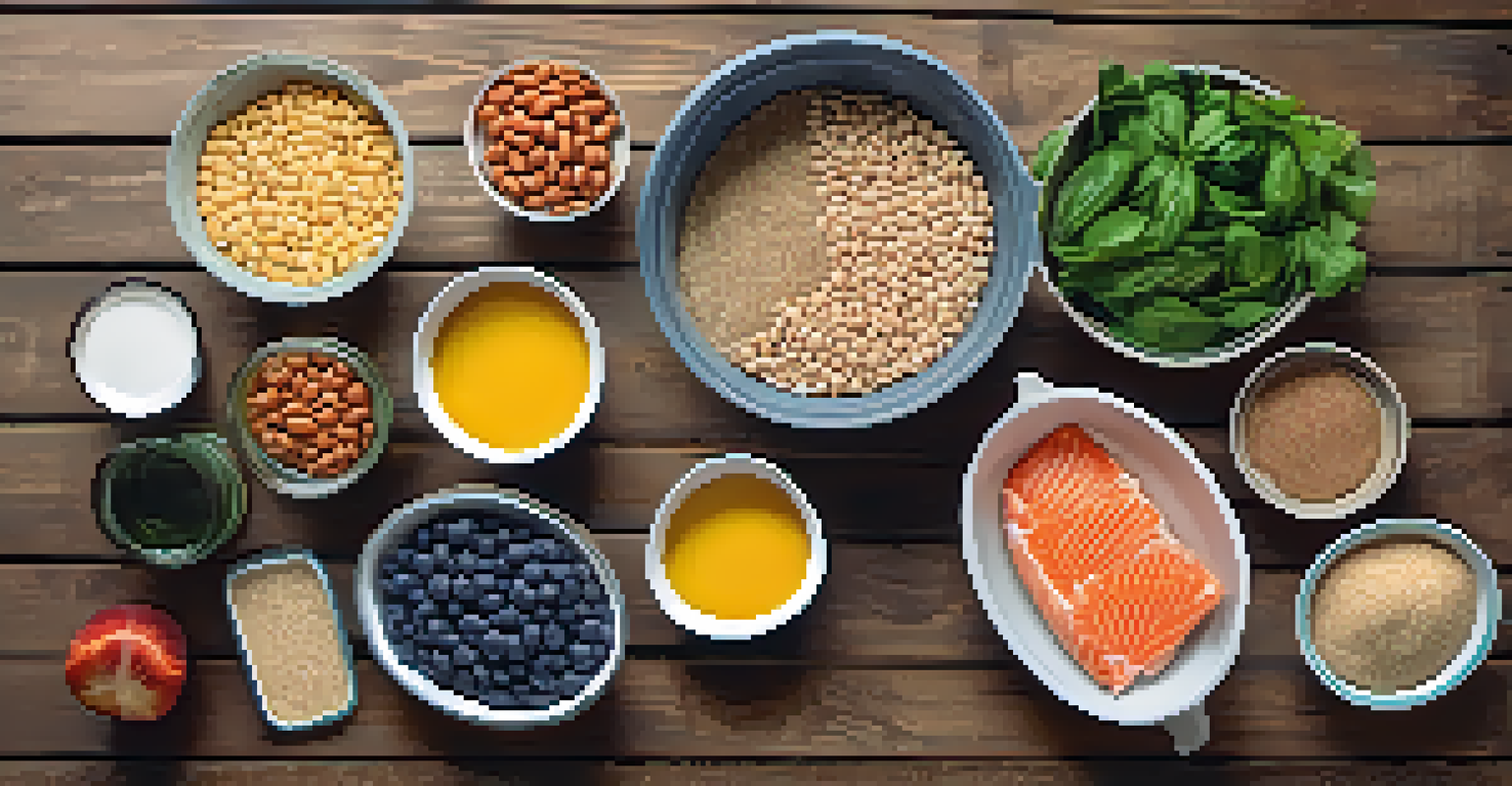Meal Timing and Its Impact on Muscle Preservation When Dieting

Understanding Meal Timing and Muscle Preservation
Meal timing refers to when you consume your meals and snacks throughout the day, which can significantly impact muscle preservation during a diet. When you're cutting calories, your body requires a strategic approach to maintain muscle mass. This is crucial because muscle not only contributes to strength but also regulates metabolism, helping you burn more calories even at rest.
You are what you eat, so don't be fast, cheap, easy, or fake.
Think of your body as a finely tuned machine that needs fuel at specific intervals to operate efficiently. Without proper timing, your body might prioritize burning muscle for energy instead of fat. Therefore, understanding how and when to eat can be the key to keeping those hard-earned muscles intact while still achieving your weight loss goals.
Research suggests that distributing your protein intake evenly throughout the day can support muscle protein synthesis. This means that rather than cramming all your protein into one meal, spacing it out allows your body to utilize it more effectively, thus promoting muscle preservation.
The Importance of Protein Timing
Protein is the building block of muscles, and timing its intake can make a world of difference. Consuming protein-rich meals or snacks every few hours provides your muscles with a steady supply of amino acids, essential for repair and growth. This is particularly important during a calorie deficit when your body is more prone to muscle breakdown.

For example, a post-workout protein shake can kickstart the recovery process, ensuring your muscles get the nutrients they need right when they need them. This timing can enhance muscle repair and growth, making your workouts more effective even while dieting.
Meal Timing Affects Muscle Health
Strategic meal timing is essential for preserving muscle mass during a calorie deficit.
Incorporating protein into your meals and post-exercise snacks can help you stay on track. Aim for a balanced intake throughout the day, including options like chicken, fish, beans, or dairy to meet your protein needs without overloading at any single meal.
Pre- and Post-Workout Nutrition Strategies
When dieting, paying attention to your pre- and post-workout nutrition can help maximize muscle preservation. A meal or snack that includes protein and carbohydrates before a workout can provide the necessary energy and prevent muscle breakdown during exercise. This can be as simple as a banana with a scoop of peanut butter or Greek yogurt with some berries.
The key is not to prioritize what's on your schedule, but to schedule your priorities.
Post-workout nutrition is equally important, as this is when your body is primed to recover and rebuild. Consuming a balanced meal or snack that includes protein and carbs within 30-60 minutes after exercising can help replenish glycogen stores and kickstart muscle recovery.
Remember, the goal is to fuel your body adequately to support your workouts while still respecting your calorie goals. This balance allows you to build a workout routine that not only burns fat but also preserves muscle.
Intermittent Fasting and Muscle Maintenance
Intermittent fasting (IF) has gained popularity as a dieting strategy, but its impact on muscle preservation is crucial to understand. IF typically involves cycling between periods of eating and fasting, which can potentially influence muscle mass if not approached correctly. The key lies in ensuring you consume enough protein and calories during your eating window.
For instance, if you’re fasting for 16 hours, make sure that your meals during the 8-hour window are nutrient-dense and protein-rich. It’s easy to overlook these factors, but doing so can help prevent muscle loss while still enjoying the benefits of fasting.
Protein Intake Supports Recovery
Regular protein consumption throughout the day enhances muscle repair and growth, especially post-workout.
Many individuals find success by planning meals that include adequate protein and calories during their eating periods. This way, you can enjoy the benefits of intermittent fasting while keeping your muscle mass intact.
The Role of Carbohydrates in Muscle Preservation
Carbohydrates often get a bad rap in the dieting world, but they play a vital role in muscle preservation. When you consume carbs, they provide energy for workouts and help replenish glycogen stores in your muscles. This is especially important when you're in a calorie deficit, as it keeps your energy levels up and helps prevent muscle breakdown.
Consider carbs as the fuel your muscles need to perform optimally. Foods like whole grains, fruits, and vegetables not only support your workouts but also aid in recovery by replenishing glycogen levels after exercise. Balancing your carb intake throughout the day can help maintain energy levels while supporting muscle health.
Incorporating healthy sources of carbohydrates around your workouts can be a game changer. This timing helps ensure your muscles are well-fueled and ready to perform, significantly impacting muscle preservation during your dieting journey.
Hydration and Its Impact on Muscle Health
Often overlooked, hydration is crucial for muscle preservation while dieting. Water plays a role in nutrient transport, digestion, and overall muscle function, making it essential to stay hydrated. Dehydration can lead to muscle cramps, fatigue, and decreased performance, all of which can hinder your progress.
During dieting, it's important to not only drink water but also to consider electrolyte balance. Electrolytes like sodium, potassium, and magnesium help maintain fluid balance and muscle function, ensuring that your body can perform at its best.
Hydration is Key for Muscle Function
Staying hydrated and maintaining electrolyte balance is crucial for optimal muscle health during dieting.
A good rule of thumb is to sip water throughout the day and increase your intake during workouts. This simple yet effective strategy can support muscle health and overall well-being while you navigate your dieting goals.
Listening to Your Body's Hunger Cues
Understanding and responding to your body's hunger cues can significantly impact muscle preservation when dieting. Often, people ignore hunger signals in their quest to reduce calories, which can lead to overeating later or muscle loss. Learning to recognize true hunger versus emotional eating can help you make more mindful choices.
For example, if you're feeling hungry before a workout, it might be a sign that your body needs fuel for optimal performance. Ignoring this can lead to a decrease in workout intensity, which ultimately impacts muscle preservation.

By tuning in to what your body is telling you, you can adjust your meal timing and intake accordingly. This practice not only supports better muscle health but also contributes to a more balanced approach to dieting.